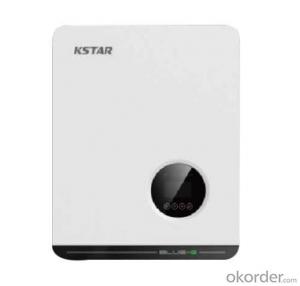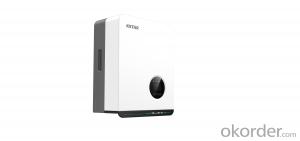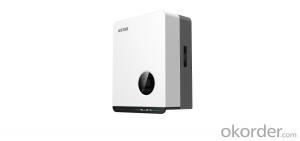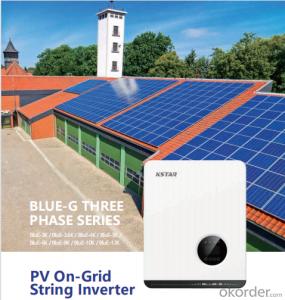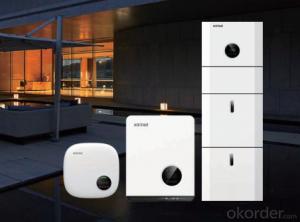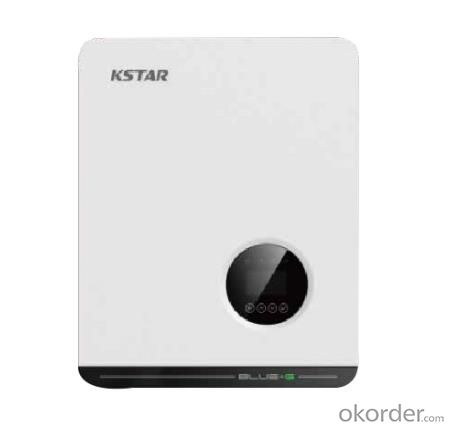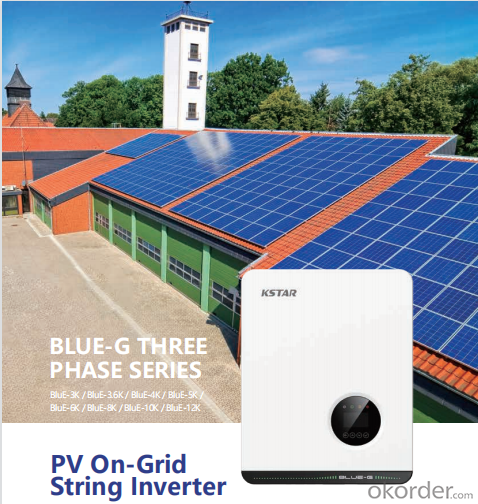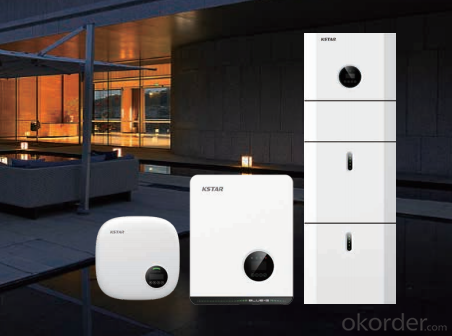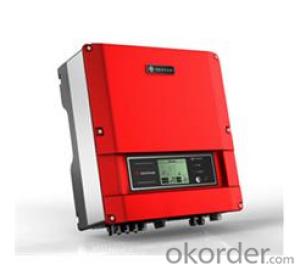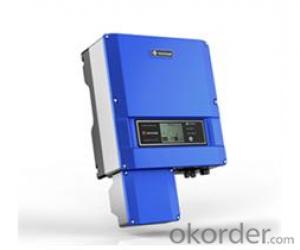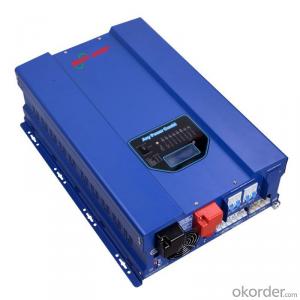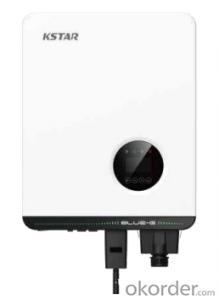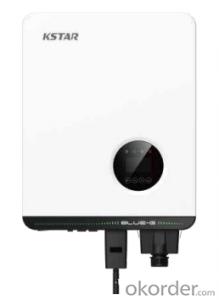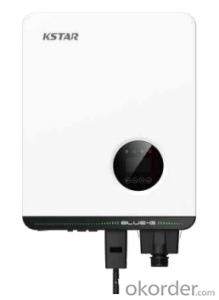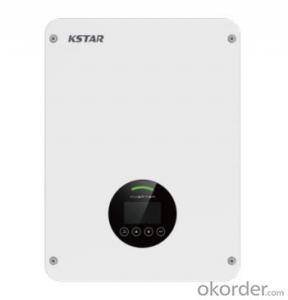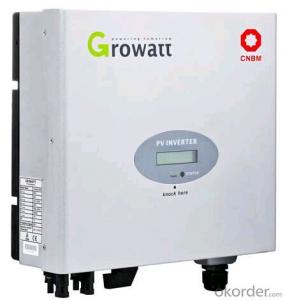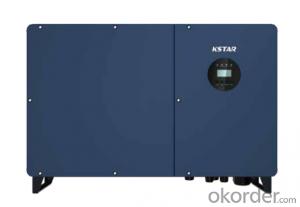Cheap Solar Inverter PV On-Grid String Inverter Blue-3KT ~ Blue-12KT
- Loading Port:
- China main port
- Payment Terms:
- TT OR LC
- Min Order Qty:
- 50 pc
- Supply Capability:
- 15000 pc/month
OKorder Service Pledge
OKorder Financial Service
You Might Also Like
Specification
Product Description:
★Max. PV voltage up to 1100V Type II DC /AC SPD
★DC/AC ratio up to 2 IP66 protection
★High efficiency up to 98.6% Smaller and lighter
★Compatible for big capacity PV panel WiFi / 4G Plug optional
Technical Specifications:
| MODEL | BluE-3KT | BluE-3.6KT | BluE-4KT | BluE-5KT | BluE-6KT | BluE-8KT | BluE-10KT | BluE-12KT |
| Input(DC) | ||||||||
| Max. DC Voltage | 1100V | 1100V | 1100V | 1100V | 1100V | 1100V | 1100V | 1100V |
| Nominal Voltage | 620V | 620V | 620V | 620V | 620V | 620V | 620V | 620V |
| Start Voltage | 180V | 180V | 180V | 180V | 180V | 180V | 180V | 180V |
| MPPT Voltage Range | 140V-1000V | 140V-1000V | 140V-1000V | 140V-1000V | 140V-1000V | 140V-1000V | 140V-1000V | 140V-1000V |
| Number of MPP Tracker | 2 | 2 | 2 | 2 | 2 | 2 | 2 | 2 |
| Strings Per MPP Tracker | 1 | 1 | 1 | 1 | 1 | 1 | 1 | 1 |
| Max. Input Current Per MPPT | 15A | 15A | 15A | 15A | 15A | 15A | 15A | 15A |
| Max. short-circuit Current Per MPPT | 20A | 20A | 20A | 20A | 20A | 20A | 20A | 20A |
| Output(AC) | ||||||||
| Nominal AC Output Power | 3000W | 3600W | 4000W | 5000W | 6000W | 8000W | 10000W | 12000W |
| Max. AC Apparent Power | 3300VA | 3960VA | 4400VA | 5500VA | 6600VA | 8800VA | 11000VA | 13200VA |
| Nominal AC Voltage | 400V 3L+N | |||||||
| AC Grid Frequency Range | 50Hz / 60Hz(±5Hz) | |||||||
| Max. Output Current | 4.8A | 5.8A | 6.4A | 8.0A | 9.6A | 12.8A | 16.0A | 19.2A |
| Power Factor (cosφ) | 0.8 leading to 0.8 lagging | |||||||
| THDi | <3%< td=""> | |||||||
| Efficiency | ||||||||
| Max. Efficiency | 98.40% | 98.40% | 98.40% | 98.40% | 98.40% | 98.60% | 98.60% | 98.60% |
| Euro Efficiency | 97.50% | 97.50% | 97.50% | 97.50% | 97.50% | 98.00% | 98.10% | 98.10% |
| Protection devices | ||||||||
| DC switch | Yes | |||||||
| Anti-islanding Protection | Yes | |||||||
| Output Over Current | Yes | |||||||
| DC Reverse Polarity Protection | Yes | |||||||
| String Fault Detection | Yes | |||||||
| AC/DC Surge Protection | DC: Type II / AC: Type III / Type II Optional | |||||||
| Insulation Detection | Yes | |||||||
| AC Short Circuit Protection | Yes | |||||||
| General Specifications | ||||||||
| Dimensions W x H x D (mm) | 380*438*161 | |||||||
| Weight(kg) | <17 | |||||||
| Operating Temperature Range | –25℃~+60℃ | |||||||
| Cooling Type | Natural Cooling | |||||||
| Max. Operation Altitude | ≤4000m | |||||||
| Max. Operation Humidity | 0-100%(No condensation) | |||||||
| AC Output Terminal Type | Quick Connector | |||||||
| IP Class | IP66 | |||||||
| Topology | Transformer-less | |||||||
| Communication Interface | RS485/WIFI/4G | |||||||
| Display | LCD | |||||||
| Certification & Standard | EN/IEC62109-1/2;IEC/EN61000-6-2;IEC/EN61000-6-4;IEC61683;IEC60068;IEC60529;IEC62116;IEC61727; EN50549-1;AS 4777.2;VDE-AR-N-4105;VDE 0126-1-1;CEI0-21;G98;G99;C10/C11;NB/T32004-2018;GB/T19964-2012 | |||||||
Q:How the output voltage of the PV inverter and the grid-connected voltage are determined
Inverter is the DC power (battery, battery) into alternating current (usually 220V, 50Hz sine wave). It consists of inverter bridge, control logic and filter circuit. Widely used in air conditioning, home theater, electric wheel, power tools, sewing machines, DVD, VCD, computer, TV, washing machine, range hood, refrigerator, video recorders, massage, fan, lighting and so on. In foreign countries
Q:Installation and maintenance of photovoltaic grid - connected inverter
only when the local power sector permission by the professional and technical personnel to complete all the electrical connection before the inverter can be connected.
Q:What is the difference between a PV grid-connected inverter and an off-grid inverter?
Off-grid inverter is equivalent to their own to establish an independent small power grid, mainly to control their own voltage, is a voltage source.
Q:After the PV inverter, how to achieve the same period before the network?
Solar panel simulator: with MPPT function, simulated morning, noon, afternoon, evening, rainy weather, solar panels produced under different conditions in different voltages.
Q:Is the PV inverter a current source or a voltage source?
According to the waveform modulation method can be divided into square wave inverter, stepped wave inverter, sine wave inverter and modular three-phase inverter.
Q:Photovoltaic grid-connected inverter without DC emc how will happen
Solar photovoltaic power generation technology is the use of solar cells, the photovoltaic effect of semiconductor materials, solar radiation can be directly converted into a new type of power generation system, solar energy is a radiant energy, solar power means --- to direct conversion of sunlight Into electricity,
Q:What is the difference between low voltage grid connection and medium voltage grid connection?
For photovoltaic power plants when the power system accidents or disturbances caused by photovoltaic power plant grid voltage drop, in a certain voltage drop range and time interval, the photovoltaic power plant can ensure that non-off-line continuous operation.
Q:Is the grid side of the grid and the inverter?
The grid load side of the grid is the grid. The inverter is an important part of the PV grid-connected system and can not be regarded as an external load. Photovoltaic power generation system is included in both grid and off-grid.
Q:PV grid-connected inverter and independent inverter in the control of what is the difference
The independent inverter in the output voltage phase amplitude of the frequency control is initially set good. Independent inverter, you should refer to off-grid inverter, do not need to consider the grid situation.
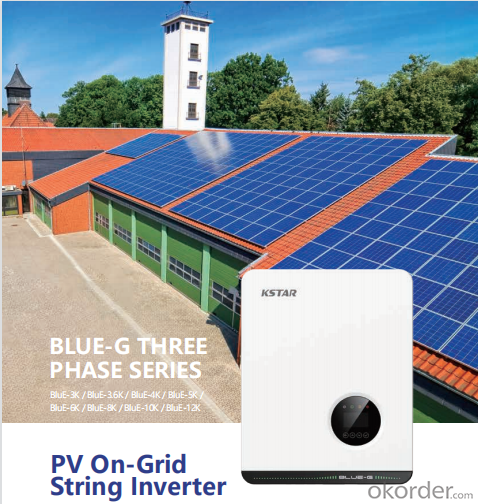
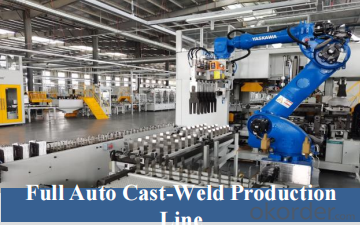
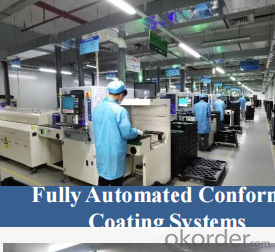
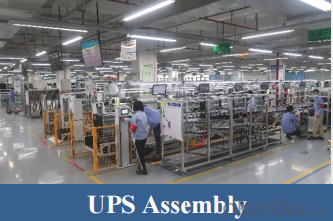
- Q: Can a solar inverter be used with solar-powered water pumps?
- Yes, a solar inverter can be used with solar-powered water pumps. A solar inverter is responsible for converting the direct current (DC) produced by solar panels into alternating current (AC) that can power electrical devices, including water pumps. This allows the solar panels to directly power the water pumps, making them suitable for off-grid or remote locations where access to electricity is limited.
- Q: How does a solar inverter handle voltage and frequency variations caused by grid faults?
- A solar inverter is designed to handle voltage and frequency variations caused by grid faults through a process known as grid support or anti-islanding function. When a grid fault occurs, such as a sudden drop in voltage or frequency, the solar inverter detects the disturbance and responds accordingly. To handle voltage variations, the solar inverter typically incorporates a voltage control mechanism. It monitors the grid voltage continuously and adjusts its own output voltage to match the grid voltage level. In the event of a voltage drop or spike caused by a grid fault, the inverter adjusts its output voltage accordingly to maintain a stable and safe operating condition. This helps protect both the solar system and the grid from potential damage. Similarly, the solar inverter also deals with frequency variations caused by grid faults. It constantly monitors the grid frequency and adjusts its own output frequency to match the grid frequency. If a grid fault results in a sudden change in frequency, the inverter responds by adjusting its own frequency accordingly. This ensures that the solar system remains synchronized with the grid and continues to supply power without disruptions. Additionally, solar inverters are equipped with anti-islanding protection, which means they are designed to quickly disconnect from the grid in the event of a grid fault. This is a safety measure to prevent the solar system from continuing to supply power to a faulty grid, which could pose a risk to utility workers trying to repair the fault. Overall, a solar inverter's ability to handle voltage and frequency variations caused by grid faults is crucial for the safe and efficient operation of a solar power system. By continuously monitoring the grid conditions and adjusting its output accordingly, the inverter ensures that the solar system remains in sync with the grid and provides stable and reliable power.
- Q: Are there any limitations on the number of solar panels that can be connected to a single inverter?
- The number of solar panels that can be connected to a single inverter is limited. Various factors, such as the inverter's power rating, the voltage and current ratings of the panels, and the system's configuration, determine the maximum number of panels that can be connected. In general, the inverter should be able to handle the combined power output of all the connected panels. If the panels generate more power than the inverter can handle, it can lead to inefficiencies, reduced performance, or damage to the inverter. Moreover, the panels' voltage and current ratings should be within the acceptable range of the inverter. If the panels exceed the inverter's safe limits, it can lead to overloading or malfunctioning. Furthermore, the configuration of the panels is also important in determining the limitations. Panels can be connected in series or parallel, each with its own requirements and limitations. The inverter must be compatible with the specific configuration used. To ensure proper functioning and optimal performance, it is advisable to refer to the manufacturer's guidelines and specifications for both the solar panels and the inverter. These guidelines provide information on the maximum number of panels that can be connected to a single inverter, as well as any other specific limitations or requirements to consider.
- Q: Can a solar inverter be used with a solar-powered educational system?
- Yes, a solar inverter can be used with a solar-powered educational system. A solar inverter is responsible for converting the direct current (DC) produced by solar panels into alternating current (AC) that can be used to power electrical devices. In the case of a solar-powered educational system, the solar inverter plays a crucial role in converting the DC energy generated by the solar panels to AC energy that can be utilized by the educational equipment, such as computers, projectors, or other electrical devices, thereby enabling the system to function efficiently.
- Q: How do you connect solar panels to a solar inverter?
- To connect solar panels to a solar inverter, you need to follow these steps: 1. Locate the positive (+) and negative (-) terminals on the solar panels. 2. Connect the positive terminal of the first solar panel to the positive terminal of the second panel using a solar PV cable or connector. Repeat this process for other panels if necessary. 3. Connect the negative terminal of the first panel to the negative terminal of the second panel using the same method as above. 4. Once all panels are connected in series or parallel, connect the positive terminal of the last panel to the positive terminal of the solar inverter. 5. Finally, connect the negative terminal of the last panel to the negative terminal of the solar inverter. It's important to ensure that the connections are secure and tightened properly to prevent any loose connections. Following the manufacturer's instructions and consulting a professional electrician or solar installer is recommended for a safe and efficient installation.
- Q: Can a solar inverter be used in a commercial solar system?
- Yes, a solar inverter can be used in a commercial solar system. A solar inverter is an essential component of a solar system as it converts the direct current (DC) generated by the solar panels into alternating current (AC) that can be used to power commercial buildings and equipment.
- Q: How does a solar inverter protect against overvoltage or overcurrent?
- A solar inverter protects against overvoltage or overcurrent by constantly monitoring the electrical output from the solar panels. It uses built-in protection mechanisms such as surge protectors, voltage regulation circuits, and current limiters to prevent the voltage or current from exceeding safe levels. If an overvoltage or overcurrent event occurs, the inverter will automatically shut down or reduce the output to protect the system and connected devices from potential damage or failure.
- Q: Can a solar inverter be used with a hybrid solar power system?
- Yes, a solar inverter can be used with a hybrid solar power system. A hybrid solar power system combines solar energy with other sources such as batteries or the electrical grid. The solar inverter is responsible for converting the direct current (DC) generated by the solar panels into alternating current (AC) that can be used to power household appliances or fed back into the grid. It plays a crucial role in ensuring the compatibility and efficient operation of the hybrid solar power system.
- Q: How does a solar inverter affect the voltage stability of a solar system?
- A solar inverter plays a crucial role in maintaining the voltage stability of a solar system. It converts the direct current (DC) produced by solar panels into alternating current (AC) that is used to power household appliances. By constantly monitoring and regulating the voltage, the solar inverter ensures that the electricity generated by the panels remains within the desired voltage range. This helps to maintain a stable and consistent power supply, protecting the solar system from voltage fluctuations and electrical damages.
- Q: How does a solar inverter handle high temperatures?
- A solar inverter is designed to handle high temperatures by incorporating various heat management techniques. It uses heat sinks, fans, or other cooling mechanisms to dissipate excess heat generated during operation. Additionally, advanced thermal management systems are employed to regulate the internal temperature and prevent overheating. This ensures the inverter's efficiency and reliability even in hot weather conditions.
Send your message to us
Cheap Solar Inverter PV On-Grid String Inverter Blue-3KT ~ Blue-12KT
- Loading Port:
- China main port
- Payment Terms:
- TT OR LC
- Min Order Qty:
- 50 pc
- Supply Capability:
- 15000 pc/month
OKorder Service Pledge
OKorder Financial Service
Similar products
Hot products
Hot Searches
Related keywords
